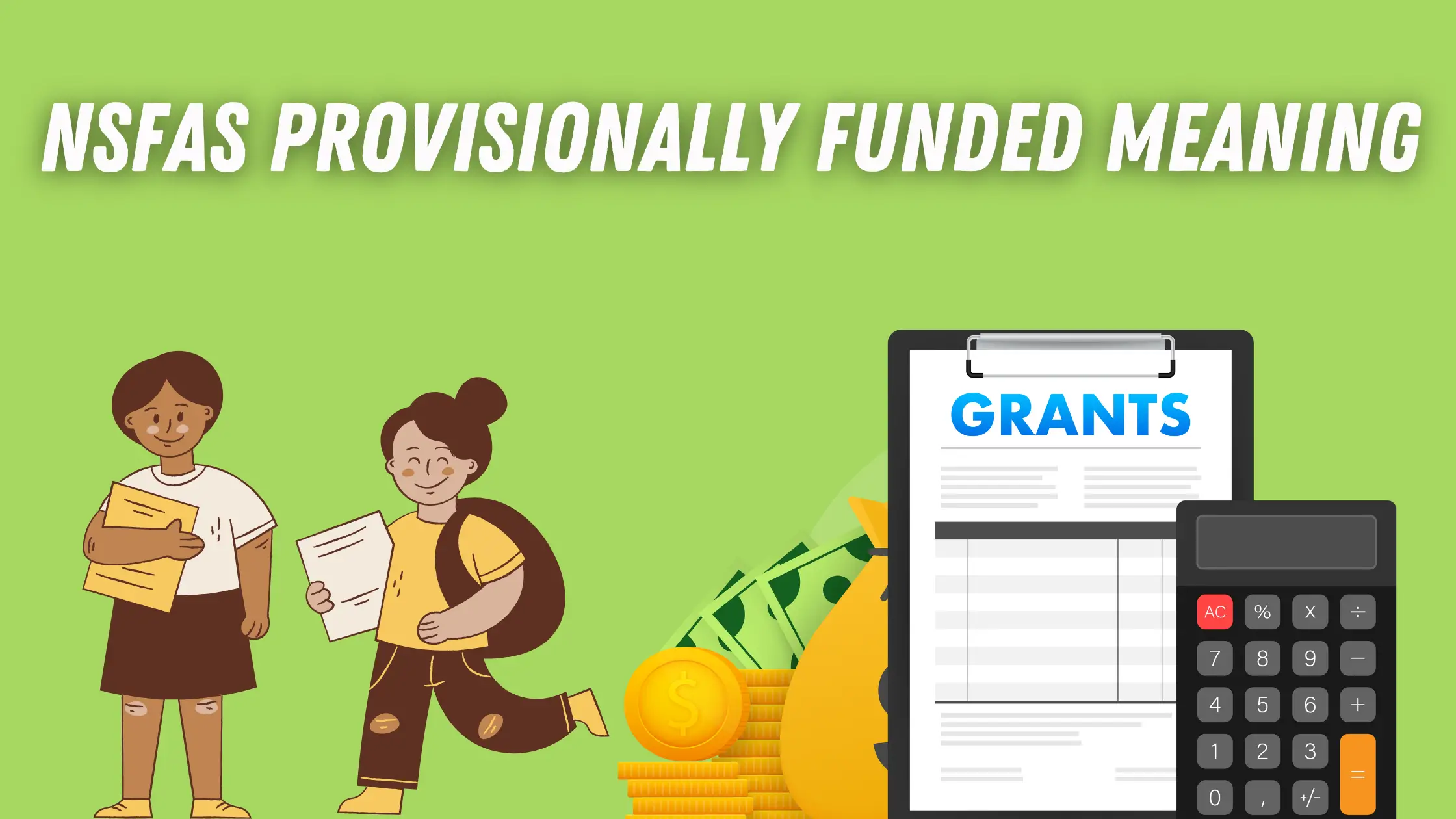In any society, education serves as a key instrument in empowering individuals and fostering socioeconomic growth. South Africa, which once significantly battled educational inequality, has made concerted efforts to ameliorate the situation and broaden the opportunities for its citizens.
One such initiative of note is the National Student Financial Aid Scheme (NSFAS). This program, which was designed to provide financial assistance for economically marginalized students, is instrumental in shaping the country’s educational landscape.
When applying for NSFAS and reviewing your application status the term ‘provisionally funded’ can be confusing to understand. In this article, we will clarifying what a provisionally funded application status for NSFAS entails.
NSFAS Provisionally Funded Meaning
The National Student Financial Aid Scheme (NSFAS) is a South African-based government organization that was established to provide financial aid to eligible students who cannot afford to pay for their tertiary education fees. The primary objective of NSFAS is to bridge the gap between the country’s educational sector and disadvantaged individuals who desire to further their studies. It operates not only in universities but also in Technical and Vocational Education and Training (TVET) colleges.
Provisionally Funded Definition
In simple terms, “provisionally funded” means that a student has been considered and approved for NSFAS funding in principle, but the final confirmation of funding is subject to the student meeting all the definitive requirements. This could include submitting required documents, signing a bursary agreement, or registering with a valid course at a public university or TVET college.
Eligibility and Application
To be eligible for NSFAS, students must be South African citizens who intend to enroll, or are already enrolled, at any of the country’s public universities or TVET colleges. They also must be proven as coming from a household with a combined income not exceeding R350,000 per year. Orphans, students with disabilities, and students coming from households with a combined income not exceeding R600,000 per year if the household supports other university students, are also considered. Applications are usually submitted online on the NSFAS website, with the necessary supporting documents.
Funding Coverage
NSFAS’s provision of financial aid isn’t just about tuition. It aims to cover all the aspects that play a pivotal role in a student’s education journey. This includes tuition, accommodation, living expenses, personal care, transport, and even resources like books or specific learning materials. The goal is to ensure that nothing hinders the student’s educational growth.
NSFAS Policies
NSFAS operates on a set of policies that govern its processes and decisions. One fundamental policy is that every student who received NSFAS funding needs to sign a legal agreement, the NSFAS Bursary Agreement (NBA), acknowledging the funding terms. If students fail to sign their NBA within the allocated period, future funding may be revoked.
Conclusion
The National Student Financial Aid Scheme (NSFAS) is an essential institution in South Africa that works to ensure qualified students aren’t prohibited from obtaining a quality education due to financial constraints. This commitment to their mission fosters national progress by investing in the education of upcoming generations. Being provisionally funded is the initial agreement to this investment, which then becomes firm once all prerequisites are fulfilled.
What does Provisionally Funded Mean For NSFAS?
In its literal sense, provisional funding refers to a temporary or conditional kind of financial aid, which is often associated with support in the educational sector. A provisionally funded scholarship or aid is granted when the final decision regarding its approval is yet to be determined. The final decision is often subject to certain conditions or standards that must be met by the individual or organization seeking the funding.
This terminology is commonly utilized in the scenario of governmental and non-profit institutions that offer financial support for educational purposes. This support is typically aimed at deserving individuals who might be unable to pursue further academic opportunities due to lack of adequate funds.
The Case of NSFAS and Provisionally Funded
NSFAS is the abbreviation for the National Student Financial Aid Scheme in South Africa. This organization operates under the Department of Higher Education and Training, providing financial assistance to eligible students at public universities and TVET colleges in South Africa.
The funding provided by NSFAS to eligible students can also sometimes be ‘provisionally funded’. This implies that NSFAS has approved a student’s application for financial aid on a tentative basis and may require more information or verification of certain details to finalize the funding. This is usually noted in the application status as ‘provisionally funded’, signaling to the students that while their application looks promising, certain conditions need to be met before the funds are definitively approved.
According to NSFAS, for students to move from provisionally funded to fully funded, they might have to meet specific requirements, provide additional documents, or perhaps wait because the final decision is pending. It’s also crucial to note that provisionally funded status does not guarantee the release of funding.
The purpose of this provisional funding system is to ensure fairness, equitability, and transparency in the process and allow for cases where, despite initial approval, changes in circumstances could affect a student’s eligibility for aid.
Unveiling the Concept of Provisional Funding
Obtaining provisional funding represents a beacon of hope for many students striving for higher education. However, it carries its own risks and uncertainties. Usually, this form of funding entails fulfilling certain conditions to transition from provisional funding to complete support. Should these terms not be met, the funding is at risk of revocation. Therefore, it’s crucial for students granted provisional funding to keep in touch with NSFAS or the relevant financial aid institution to ensure they meet all stipulations, initiating the finalization of the funding process.
In essence, whilst provisional funding opens potential gateways to greater educational opportunities, it’s still subject to conditions, and until these are met, offers no final guarantee.
Examining Provisionally Funded within NSFAS
In the context of NSFAS, the term “provisionally funded” refers to the temporary approval of financial aid for a student, typically subject to the final confirmation of available funding and the verification of academic results once they are released. Essentially, a student who is provisionally funded has the potential to receive NSFAS funding, but final approval is contingent on specific qualifiers.
The Application and Verification Process
The NSFAS application process involves filling out an online application form with personal and financial information, along with proof of household income. Once the application period is closed, all applications are evaluated. Those students who are deemed eligible (based on the means test) are provisionally funded. This provisional approval, however, is subject to verification.
The NSFAS then carries out an extensive verification process. This involves verifying the information provided in the application forms, corroborating the financial need of the applicant, and validating the academic qualifications. Often, this requires the student to submit relevant documentation for checks against various databases.
From Provisionally Funded to Fully Funded
Once the verification process is completed, provisional funding status can either be confirmed or reviewed. If all verification checks come out positive, the student will be moved from being provisionally funded to fully funded. The funds are then disbursed to the respective universities or colleges, who will then apply the funds to the student’s account. This could cover tuition fees, accommodation, meal allowances, and sometimes book allowances.
The Impact on Students
Being provisionally funded through NSFAS can have a major impact on students. Besides reducing the financial burden associated with higher education, it also provides certainty, allowing students to focus more on their studies rather than worrying about where their next tuition installment will come from. Even though the funding status is provisional, it is a significant step towards securing their future education.
In sum, the term “provisionally funded” within the NSFAS context is a positive indication that a student is on the path to receiving financial aid for their education. However, it is contingent upon the validation of the student’s need for assistance and their academic potential.
In Summary
The NSFAS ‘provisionally funded’ status refers to the temporary approval of financial aid for student applicants. In short, the student will be funded their grant allowance after the verification of their information.
This article highlights the importance of the NSFAS application status, the accuracy of the information, and even how to get go from provisionally funded to fully funded.


